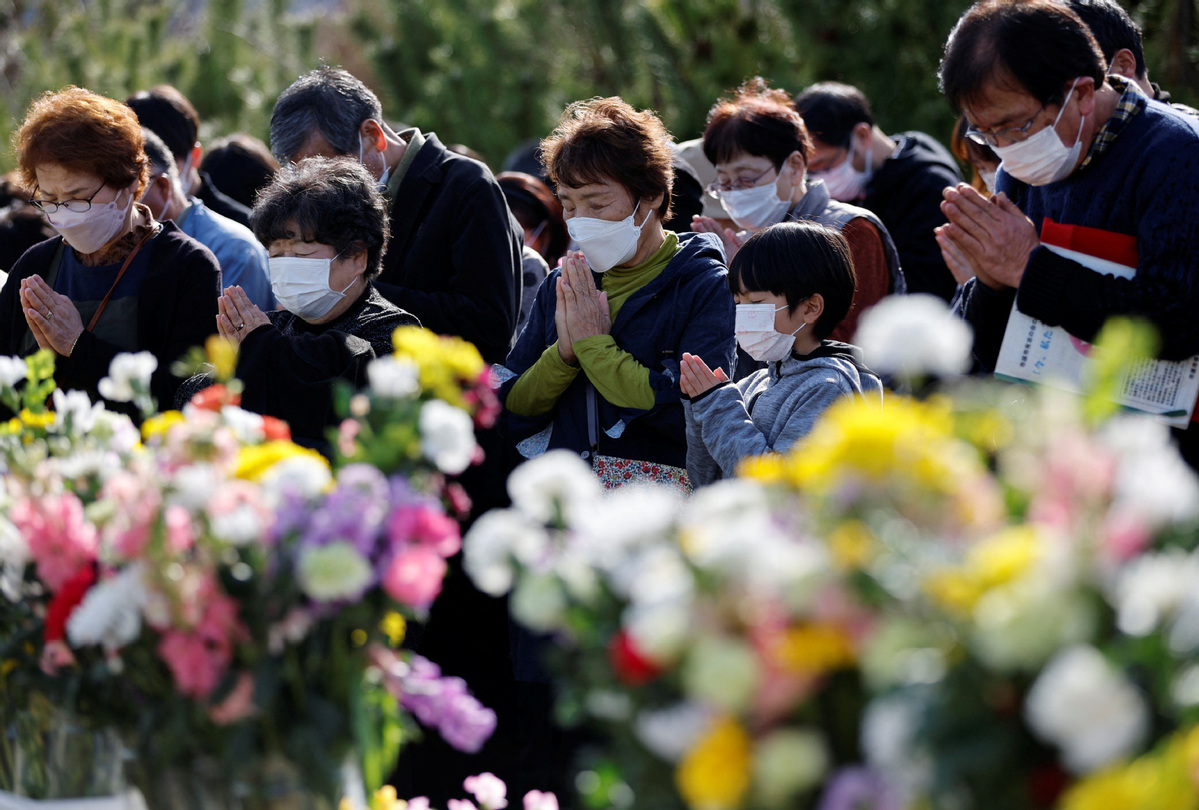Fukushima victims feel left out
By WANG XU in Tokyo | China Daily | Updated: 2023-03-13 09:26
Editor's note: On Saturday, Japan marked the 12th anniversary of the massive earthquake, tsunami and nuclear disaster with a minute of silence, as global concerns grew ahead of the planned release into the Pacific Ocean of nuclear-contaminated water from the wrecked Fukushima nuclear power plant. China Daily reviews how locals are still suffering from the disaster and their opposition to the controversial discharge plan.

After catastrophe, only a handful of evacuated residents prefer to return
For the past 12 years Honoka, now 85, has been one of thousands of Japanese who have taken part in protests outside the Ministry of Economy, Trade and Industry in Tokyo.
Their bone of contention: the handling of contaminated water in the Fukushima Daiichi Nuclear Power Plant, eastern Japan, wrecked by an earthquake and tsunami that killed more than 15,000 people and triggered the meltdown of three nuclear reactors as well as the release of large amounts of radiation.
The dark 12th anniversary of that disaster was marked on Saturday.
Honoka, who requested not to be fully identified, said she was moved by the resilience and determination of Fukushima people and thus volunteered to join them to raise broader awareness about the challenges and hardships they face. She is not from Fukushima, she said.
"Many of them were forced to leave their homes in the aftermath of the disaster, unsure of when, or if, they would be able to return."
The national government's handling of the disaster had left her feeling betrayed, she said.
"The government abandoned the people of Fukushima when they needed it most."
Nevertheless, over the years there has been a concerted drive to rebuild Fukushima and bring back those who left it. Now one of the major concerns is what to do with the nuclear-contaminated water in the plant, and in particular official plans to start releasing it into the Pacific Ocean.
The toxic water has been used to cool the highly radioactive, damaged reactor cores, and there is enough of it to fill 500 Olympic-size swimming pools. The government has said it plans to start discharging the water this spring or summer.
"Dumping the toxic water is contrary to a government pledge of rebuilding my hometown of Fukushima, because it threatens a double blow to our community," said Hisae Unuma, one of the 160,000 people evacuated from the region and who has been among those pushing for the government to scrap its discharge plan.
Many evacuees such as Unuma have refused to return to their hometowns even though the government has lifted evacuation orders and spent huge amounts of money on rebuilding local facilities and housing.
The Board of Audit, which reviews national government spending, says Japan has spent about 1 trillion yen ($7.3 billion) a year on handling the disaster, and how much the total will be for dealing with its aftermath is unknown.
The Reconstruction Agency says about 80,000 residents have been evacuated from Fukushima prefecture since 2011, and just 16,000 of them have returned home.
In the Tsushima district of Namie town, which once had a population of 1,400, and where reconstruction work has just finished, fewer than 10 residents are reported to have said they plan to move back this spring.
For those who have returned or never left, life promises to be far from ideal, because the agriculture and fishing industries, once the lifeblood of the region, have been devastated by the disaster.
As the Fukushima plant's operator, Tokyo Electric Power Company, moves closer to discharging the nuclear-contaminated water, local opposition has intensified.
"The government gave us a promise and is now doing exactly the opposite," said Tetsu Nozaki, head of Fukushima Prefectural Federation of Fisheries Cooperative Associations, referring to an agreement reached by it, the national government and TEPCO.
"The treated water must not be released without the consent of all those involved."
wangxu@chinadaily.com.cn
























